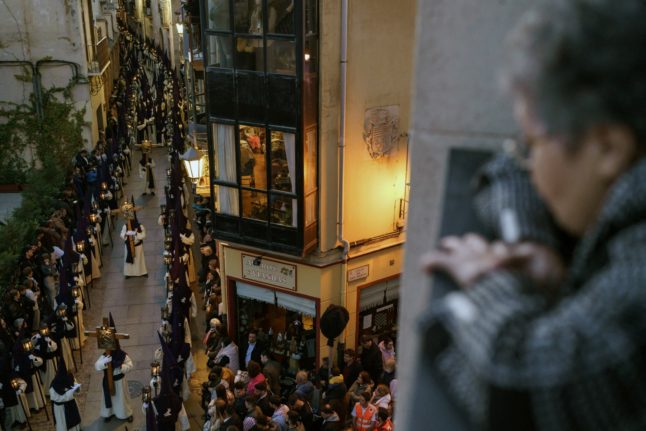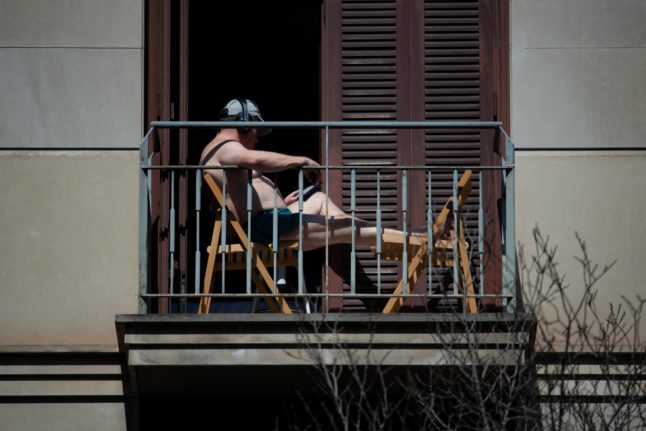As you might’ve noticed, Easter is a pretty big deal in Spain. As such, there are several public holidays coming up, as well as different regional holidays, and this will means some of your local shops and other establishments will be closed, or open with reduced hours.
Easter holidays in Spain in 2024
Technically speaking, Easter 2024 runs from Sunday March 24th (Domingo de Ramos, Palm Sunday) until April 1st (Lunes de Pascua, Easter Monday).
The only public holiday across all Spanish regions this Easter is Good Friday on March 29th.
Maundy Thursday (March 28th) is also a holiday in all regions except Catalonia and the Community of Valencia, which will instead have Easter Monday (April 1st) off as a regional holiday.
Some regions – the Balearic Islands, Cantabria, Navarra and the Basque Country – have regional holidays on both Thursday March 28th and April Monday 1st, giving them a five-day puente, as it’s called in Spanish (literally meaning ‘bridge’).
READ ALSO: Spain’s public and regional holidays in 2024 and how to maximise your leave
Supermarkets
As a general rule, if it’s a regional or national holiday, supermarkets in the region where you are in Spain will be closed.
It’s also worth keeping in mind that most supermarkets generally don’t open on Sundays either, meaning that Saturday March 30th is a good day to do your grocery shopping, or consider stocking up beforehand on Wednesday March 27th or earlier.
Mercadona
Mercadona will be closed on Maundy Thursday and Good Friday, except in Catalonia and Valencia. Mercadona will be open across Spain on Saturday March 30th from 9 or 9.30 to 21.30, its usual opening hours. To check your local Mercadona branch, you can use the store finder tool here.
Carrefour
Carrefour doesn’t seem to have a clear-cut policy regarding opening and closing on public holidays. As such, some of its supermarkets will open on Maundy Thursday and Good Friday, while others will be closed, depending on the region.
However, its smaller Carrefour Express stores are likely to be open on all days over Easter in Spain. You can check your local here.
Aldi
Aldi supermarkets close on regional and public holidays, so they will not open on Maundy Thursday (except for in Catalonia and the Valencia region) nor on Good Friday. Find your closest Aldi here.
Ahorramás
The franchise, which has shops located in Castilla-La Mancha and Madrid, will open almost all its shops on Maundy Thursday until 15:00.
To check your nearest store, you can check this link.
Lidl
Again, Lidl will open some shops on Maundy Thursday and Good Friday. You can check whether a particular shop is open and on which days via this link.
Consum
Consum supermarkets in the Valencia region will be open on Maundy Thursday but not on Good Friday.
Pharmacies
Whether your closest farmacia will be open over Semana Santa depends on where you live and their own policy. Most pharmacies may open with ‘holiday’ hours on Maundy Thursday (March 28th), which is usually 9am-2pm, though it will depend on the individual branch.
In bigger towns and cities there will likely be some open on Good Friday (March 29th) too.
Are bars and restaurants open over Easter?
Similarly, bars and restaurants decide themselves with regards to opening hours on public holidays.
Your local bar might be closed, but bigger restaurants will likely open. If there Easter processions taking place and plenty of tourists and other potential customers on Maundy Thursday and Good Friday, you shouldn’t have trouble finding a restaurant to eat at, especially in big cities and touristy spots.
You can expect lots more of them to be open on Saturday March 30th, and on Sunday 31st it will again depend on the individual decision of the restaurant owners.
Fast food restaurants such as McDonalds and Burger King will likely be open on all days throughout Easter 2024 in Spain.
Are shops open over Easter in Spain?
Again, it’s hard to give an across-the-board answer. Your local ferretería (hardware shop) and other small local businesses will probably be closed on regional and public holidays, but bigger chains in cities will likely open for at least some of the day.
Fruterías (green grocers) and locally run corner shops in big cities tend to stay open on public holidays.
Estancos (tobacco stores) will almost certainly be closed, except for perhaps in larger city centres.
In Spain, a number of establishments are exempt from normal commercial opening hours legislation and can therefore decide for themselves whether or not to open on public holidays.
According to the law, they are:
“Establishments mainly engaged in the sale of pastries and confectionery, bread, ready meals, newspapers, fuels and combustibles, florists and plants.
Convenience stores.
Commercial establishments located at border points, stations and means of land, sea and air transport.
Establishments located in areas of great tourist influx” – known as ZGATs in Spain.
That basically means that if you’re in a major city, the chances are that most shops will be open for at least some of the day.
READ ALSO: Spain’s Easter white hoods are a symbol of penance, not right-wing extremism



 Please whitelist us to continue reading.
Please whitelist us to continue reading.
Member comments